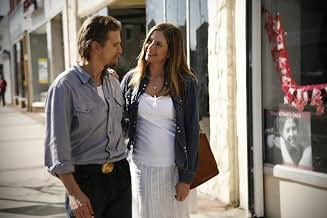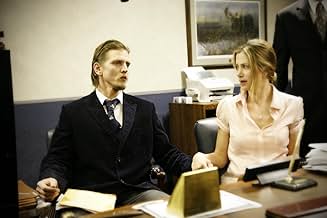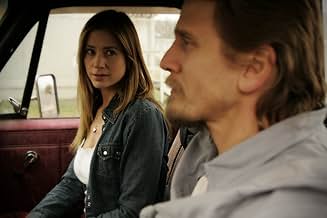AVALIAÇÃO DA IMDb
7,0/10
3,3 mil
SUA AVALIAÇÃO
Um homem e sua esposa são pressionados até o limite quando os pais biológicos de seu filho adotivo tentam recuperar sua custódia.Um homem e sua esposa são pressionados até o limite quando os pais biológicos de seu filho adotivo tentam recuperar sua custódia.Um homem e sua esposa são pressionados até o limite quando os pais biológicos de seu filho adotivo tentam recuperar sua custódia.
- Direção
- Roteiristas
- Artistas
- Prêmios
- 20 vitórias no total
- Direção
- Roteiristas
- Elenco e equipe completos
- Produção, bilheteria e muito mais no IMDbPro
Avaliações em destaque
"Adoption is a redemptive response to tragedy that happens in this broken world" (Katie J. Davis, Kisses from Katie: A Story of Relentless Love and Redemption).
I have selected this quote to open my review because it seems that the key aspect which underlines the 'message' of Jon Gunn's movie is adoption collaborating with redemption. Before getting into a variety of psycho-emotional development of captivating and educational human experience, it is important to state that at the heart of this movie is a 6 year old boy Joey (Maxwell Perry Cotton). This little character leads us into the inner world of child's fragile feelings which are put to test in two families: his real one and the adoptive one. However, the movie does not open with a child but a parent, Rip Porter (Barry Pepper) who is clearly a grown up but not a mature man. He is a psychologically wounded man who finds for himself a victim, his wife Wendy (Mira Sorvino). The opening mis-en-scene proves that assumption right. Marital violence within the marital status leads his wife to give up the upbringing of her newborn baby, her dreams appear to be in vain...yet, 7 years later, bad events may be turned into a renewed, redemptive reality no one would have ever predicted.
Not to reveal much about the content which really keeps viewer's attention, let me make myself clear about what I mean by 'captivating and educational human experience' The strongest point of LIKE DANDELION DUST is the powerful depiction of FEELINGS. This is neither a fake sentimentalism or any tear jerking hypnosis. You can find anything human in this story from nervous breakdowns, inner struggles, determination, honor to sacrifice, spiritual growth and redemption. How can a story brought to screen fail to captivate viewers when they see something that authentic? Four characters, two married couples provoke our insightful viewing into what a human character really is and into a prospect how they can change and what they may become...if only they want. Although Joey is at the center of attention, it is in the way they deal with him when we get to know them. But, this appears to be extremely important to mention: no judgment is being made, none of the characters is good or bad. These terms simply do not work, which makes it possible to make a starting point truly psychological. Let me focus on this point more deeply. But before this, consider the crucial aspect in all of them: ALL CHARACTERS CHANGE. Isn't that educational at the same time?
THE PORTERS: Being perhaps the least sympathetic of them all, Rip Porter is most memorable. His neurotic nature combined with addiction and prison experience do not allow him to be a good father to Joey and a good husband to Wendy. His fault is, consequently, the most serious one and yet, it is not his last chance. There is constantly an opportunity to change. Along with his character, there is a never ending theme of redemption indicated, so widely discussed in cinema from its very beginnings, just to mention THE PHANTOM CARRIAGE (1921). Rip, played vibrantly by Barry Pepper, supplies us with an intriguing insight into an unpredictable, furious addict with a slight bit of honor still left. His scenes with Wendy and Joey may shock at certain moments but when we constantly keep in mind the opening scene of the movie, it appears easier to justify his behavior or at least see a clear reason for why he is the way he is. Doesn't it appear parallel to real life? Wendy is a good loving mother; yet her status cannot allow her to be the way she dreams to be. Her sacrifice is the greatest and her struggles seemingly unendurable...consider the scene she tries to stop her husband from drinking.
THE CAMPBELLS: The adoptive parents are an absolutely different sort of family. While Jack is a settled down man of career and high financial status, he takes everything for granted. His offer to Rip that results in a fight is a beautifully psychological presentation of prefabricated materialist suggestions vs unpredictable eccentric outbursts. Money simply cannot interfere in the context like this and it cannot. Cole Hauser gives an adequate performance of a settled 'gentleman' and, at the same time, a 'requiring' husband. Molly is an absolutely different wife than Wendy is and clearly less prone to...determination. Doesn't our lifestyle with its conditions shape ourselves?
In between them comes a CHILD that renews, a CHILD that offers change, a CHILD that leads to sacrificial love, a CHILD that seems to know love more than the wisest elderly geniuses, a CHILD that does not need linguistic ornaments or legal regulations in order to realize where genuine feelings are. And this little CHILD brings something most desirable and yet so hard to achieve: redemption. That is, consequently, so trustworthy, that is so real and so unique about the film, so educational and so captivating. Maxwell Perry Cotton's performance is worth attention and can be considered as one of the great child achievements in cinema. Many scenes are so authentically played that you as a viewer may quite forget it is not a real story but only a film.
A highly recommended movie with clear redemptive psychology and trustworthy storytelling that is not only appealing to modern viewers but very thought provoking. There is a HUMAN solution to the tragedy of the broken world, after all.
I have selected this quote to open my review because it seems that the key aspect which underlines the 'message' of Jon Gunn's movie is adoption collaborating with redemption. Before getting into a variety of psycho-emotional development of captivating and educational human experience, it is important to state that at the heart of this movie is a 6 year old boy Joey (Maxwell Perry Cotton). This little character leads us into the inner world of child's fragile feelings which are put to test in two families: his real one and the adoptive one. However, the movie does not open with a child but a parent, Rip Porter (Barry Pepper) who is clearly a grown up but not a mature man. He is a psychologically wounded man who finds for himself a victim, his wife Wendy (Mira Sorvino). The opening mis-en-scene proves that assumption right. Marital violence within the marital status leads his wife to give up the upbringing of her newborn baby, her dreams appear to be in vain...yet, 7 years later, bad events may be turned into a renewed, redemptive reality no one would have ever predicted.
Not to reveal much about the content which really keeps viewer's attention, let me make myself clear about what I mean by 'captivating and educational human experience' The strongest point of LIKE DANDELION DUST is the powerful depiction of FEELINGS. This is neither a fake sentimentalism or any tear jerking hypnosis. You can find anything human in this story from nervous breakdowns, inner struggles, determination, honor to sacrifice, spiritual growth and redemption. How can a story brought to screen fail to captivate viewers when they see something that authentic? Four characters, two married couples provoke our insightful viewing into what a human character really is and into a prospect how they can change and what they may become...if only they want. Although Joey is at the center of attention, it is in the way they deal with him when we get to know them. But, this appears to be extremely important to mention: no judgment is being made, none of the characters is good or bad. These terms simply do not work, which makes it possible to make a starting point truly psychological. Let me focus on this point more deeply. But before this, consider the crucial aspect in all of them: ALL CHARACTERS CHANGE. Isn't that educational at the same time?
THE PORTERS: Being perhaps the least sympathetic of them all, Rip Porter is most memorable. His neurotic nature combined with addiction and prison experience do not allow him to be a good father to Joey and a good husband to Wendy. His fault is, consequently, the most serious one and yet, it is not his last chance. There is constantly an opportunity to change. Along with his character, there is a never ending theme of redemption indicated, so widely discussed in cinema from its very beginnings, just to mention THE PHANTOM CARRIAGE (1921). Rip, played vibrantly by Barry Pepper, supplies us with an intriguing insight into an unpredictable, furious addict with a slight bit of honor still left. His scenes with Wendy and Joey may shock at certain moments but when we constantly keep in mind the opening scene of the movie, it appears easier to justify his behavior or at least see a clear reason for why he is the way he is. Doesn't it appear parallel to real life? Wendy is a good loving mother; yet her status cannot allow her to be the way she dreams to be. Her sacrifice is the greatest and her struggles seemingly unendurable...consider the scene she tries to stop her husband from drinking.
THE CAMPBELLS: The adoptive parents are an absolutely different sort of family. While Jack is a settled down man of career and high financial status, he takes everything for granted. His offer to Rip that results in a fight is a beautifully psychological presentation of prefabricated materialist suggestions vs unpredictable eccentric outbursts. Money simply cannot interfere in the context like this and it cannot. Cole Hauser gives an adequate performance of a settled 'gentleman' and, at the same time, a 'requiring' husband. Molly is an absolutely different wife than Wendy is and clearly less prone to...determination. Doesn't our lifestyle with its conditions shape ourselves?
In between them comes a CHILD that renews, a CHILD that offers change, a CHILD that leads to sacrificial love, a CHILD that seems to know love more than the wisest elderly geniuses, a CHILD that does not need linguistic ornaments or legal regulations in order to realize where genuine feelings are. And this little CHILD brings something most desirable and yet so hard to achieve: redemption. That is, consequently, so trustworthy, that is so real and so unique about the film, so educational and so captivating. Maxwell Perry Cotton's performance is worth attention and can be considered as one of the great child achievements in cinema. Many scenes are so authentically played that you as a viewer may quite forget it is not a real story but only a film.
A highly recommended movie with clear redemptive psychology and trustworthy storytelling that is not only appealing to modern viewers but very thought provoking. There is a HUMAN solution to the tragedy of the broken world, after all.
There were so many things to like about this movie and so many talking points.
While the movie was a little too stereo typed for my liking, stereo types exist for a reason.
I thought the Porter side of the story was extremely well done. Wendy Porter played the abused wife brilliantly, acting as abused and battered women often do.
I was perplexed as to why Wendy would want her biological son to live with her though. Perhaps the fact that her husband wanted the boy influenced her. After all, what is in the best interest of the child? What they went through with the boy, and their experiences was so well done it was very difficult to watch.
The Campbell's were the boy's adoptive parents and they were portrayed as such the perfect family, that you couldn't help but want the boy to stay with them. I found the way they acted, especially the way Holly Campbell reacted was a little too unrealistic but then again, I've never been in the position of potentially losing my child.
This is a powerful movie. Definitely one to stir the emotions.
While the movie was a little too stereo typed for my liking, stereo types exist for a reason.
I thought the Porter side of the story was extremely well done. Wendy Porter played the abused wife brilliantly, acting as abused and battered women often do.
I was perplexed as to why Wendy would want her biological son to live with her though. Perhaps the fact that her husband wanted the boy influenced her. After all, what is in the best interest of the child? What they went through with the boy, and their experiences was so well done it was very difficult to watch.
The Campbell's were the boy's adoptive parents and they were portrayed as such the perfect family, that you couldn't help but want the boy to stay with them. I found the way they acted, especially the way Holly Campbell reacted was a little too unrealistic but then again, I've never been in the position of potentially losing my child.
This is a powerful movie. Definitely one to stir the emotions.
When the father is an alcoholic abuser and the mother can't stick up for herself, there's always hope that the son will get to a better home. "Like Dandelion Dust" explores that hope and the powers of wealth, love and family.
The strength of the film lies in its story-telling. The characters were all painted extremely realistically and even sympathetically, and every scene in the film advanced the plot. Written by Oscar-nominated writer Stephen J. Rivele and Michael Lachance, it certainly comes across as a film driven by the writing. But no matter how interesting the story was, they couldn't completely keep my attention. When we have gritty scenes, we get drab shots. The story really wasn't brought to life.
"Like Dandelion Dust" is less like a film and more like a novel. And unsurprisingly, it is a novel with the same name by Karen Kingsbury. As I have just learned, Kingsbury is known as a Christian novelist. Although religion is an element in this film, it's presented in a very subtle, questioning way. See "Like Dandelion Dust" because it's a novel, not because it's a Christian novel.
The strength of the film lies in its story-telling. The characters were all painted extremely realistically and even sympathetically, and every scene in the film advanced the plot. Written by Oscar-nominated writer Stephen J. Rivele and Michael Lachance, it certainly comes across as a film driven by the writing. But no matter how interesting the story was, they couldn't completely keep my attention. When we have gritty scenes, we get drab shots. The story really wasn't brought to life.
"Like Dandelion Dust" is less like a film and more like a novel. And unsurprisingly, it is a novel with the same name by Karen Kingsbury. As I have just learned, Kingsbury is known as a Christian novelist. Although religion is an element in this film, it's presented in a very subtle, questioning way. See "Like Dandelion Dust" because it's a novel, not because it's a Christian novel.
I just watched this movie and had a hard time keeping a dry eye. The sad truth is there are cases similar to this going on in family court everyday..maybe not as extreme as this one (most kids are less than 6 years old) but fights between bio parents, foster parents and adoptive parents go on every day. This is an adoptive parents nightmare. I thought the performances by all were solid and very believable. The kid that played Joey is so cute and a good little actor. I really do not understand how people can bash this movie. They must not be adults, or parents for that matter. The subject matter is very surreal and let me tell you, I would have done the EXACT same thing as the adoptive parents did in this movie.
LIKE DANDELION DUST is a very small scaled film about a very large subject: adoption and the struggles that at times are associated between birth parents and adoptive parents. Adapted from Karen Kingsbury's popular novel by Stephen J Rivele and Michael Lachance and directed with sensitivity and fine pacing by Jon Gunn, the film succeeds primarily because of the exceptional acting on the part of the acting by Mira Sorvino and Barry Pepper.
Blue collar worker Richard 'Rip' Porter (Barry Pepper) is an alcoholic with anger management problems and as the film opens he is arrested for beating his wife Wendy (Mira Sorvino) and imprisoned for seven years. Simultaneously we meet the wealthy Jack Campbell (Cole Hauser) and his wife Molly (Kate Levering) who are playing with their six year old son Joey (Maxwell Perry Cotton) and interacting with Molly's sister Beth (Abby Brammell) and husband Bill (Kirk B.R. Woller) who are suggesting that Joey, being adopted, should be brought up in the church: there is conflict as Beth seems to feel Molly isn't caring correctly for Joey since he is adopted!
Rip is released form prison and is clean from his alcoholism and anger management problems and Wendy confesses that when Rip was incarcerated she had been pregnant and because of Rip's problems she put her newborn son up for adoption, having her mother sign for Rip. Rip is shocked with the news and at once wants to get his son back. An adoption agency is consulted in the person of Allyson Bower (L. Scott Caldwell) who is placed between the Porters and the Campbells in making the decision as to where Joey should be. Because of the forged adoption papers Joey is still the child of the Porters and they fight the Campbells for custody. Joey is in the middle and with Allyson's guidance tries to adapt to his birth parents on planned visits while the Campbells try every avenue to retain their beloved Joey. How the game is played includes errors on the parts of both sets of parents but the situation is finally resolved in a very touching manner.
Sorvino and Pepper are brilliant in their roles as the beleaguered Porters. The reason the film works as well as it does is the fact that the good and bad aspects of human behavior on the part of all the characters in the film is balanced. It is a realistic look at what appears on the surface to be polar opposite couples - and in the middle is the very finely tuned performance of little Maxwell Perry Cotton. This is a film that tugs a bit heavily on the heartstrings, but for anyone who has been involved in an adoption problem it will ring true.
Grady Harp
Blue collar worker Richard 'Rip' Porter (Barry Pepper) is an alcoholic with anger management problems and as the film opens he is arrested for beating his wife Wendy (Mira Sorvino) and imprisoned for seven years. Simultaneously we meet the wealthy Jack Campbell (Cole Hauser) and his wife Molly (Kate Levering) who are playing with their six year old son Joey (Maxwell Perry Cotton) and interacting with Molly's sister Beth (Abby Brammell) and husband Bill (Kirk B.R. Woller) who are suggesting that Joey, being adopted, should be brought up in the church: there is conflict as Beth seems to feel Molly isn't caring correctly for Joey since he is adopted!
Rip is released form prison and is clean from his alcoholism and anger management problems and Wendy confesses that when Rip was incarcerated she had been pregnant and because of Rip's problems she put her newborn son up for adoption, having her mother sign for Rip. Rip is shocked with the news and at once wants to get his son back. An adoption agency is consulted in the person of Allyson Bower (L. Scott Caldwell) who is placed between the Porters and the Campbells in making the decision as to where Joey should be. Because of the forged adoption papers Joey is still the child of the Porters and they fight the Campbells for custody. Joey is in the middle and with Allyson's guidance tries to adapt to his birth parents on planned visits while the Campbells try every avenue to retain their beloved Joey. How the game is played includes errors on the parts of both sets of parents but the situation is finally resolved in a very touching manner.
Sorvino and Pepper are brilliant in their roles as the beleaguered Porters. The reason the film works as well as it does is the fact that the good and bad aspects of human behavior on the part of all the characters in the film is balanced. It is a realistic look at what appears on the surface to be polar opposite couples - and in the middle is the very finely tuned performance of little Maxwell Perry Cotton. This is a film that tugs a bit heavily on the heartstrings, but for anyone who has been involved in an adoption problem it will ring true.
Grady Harp
Você sabia?
- CuriosidadesThe scene where Berry Pepper's character, Rip, is bitten by his dog was not part of the script until the dog decided to improvise it. Berry Pepper was actually bitten by his fellow actor, the dog.
- Erros de gravaçãoIn the kitchen scene after Rip Porter smashes his empty bottle and gets consoled by Wendy, the positions of his head and of their hands around each other's heads change too suddenly between the subsequent shots while lines are being spoken across the cuts.
- Citações
Wendy Porter: There is one thing that - -- that you could do for me. I would like Joey to know that he has two mothers: one that loved him so much that she couldn't let him go, and one that loved him so much that she had to.
- Trilhas sonorasThe Lord Bless You and Keep You
Words and Music by Peter C. Lutkin
Performed by Coral Ridge Presbyterian Church Chancel Choir
Choir directed by John L. Wilson
Principais escolhas
Faça login para avaliar e ver a lista de recomendações personalizadas
Detalhes
- Data de lançamento
- País de origem
- Central de atendimento oficial
- Idioma
- Também conhecido como
- Like Dandelion Dust
- Locações de filme
- Empresas de produção
- Consulte mais créditos da empresa na IMDbPro
Bilheteria
- Orçamento
- US$ 2.500.000 (estimativa)
- Faturamento bruto nos EUA e Canadá
- US$ 352.810
- Fim de semana de estreia nos EUA e Canadá
- US$ 77.960
- 26 de set. de 2010
- Faturamento bruto mundial
- US$ 352.810
- Tempo de duração1 hora 40 minutos
- Cor
- Mixagem de som
- Proporção
- 2.35 : 1
Contribua para esta página
Sugerir uma alteração ou adicionar conteúdo ausente
























